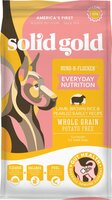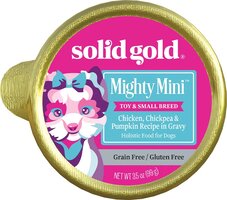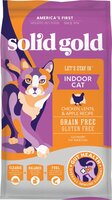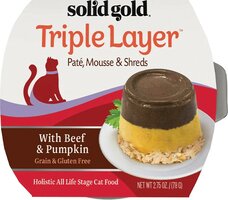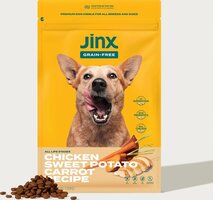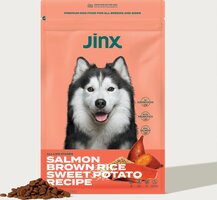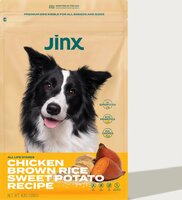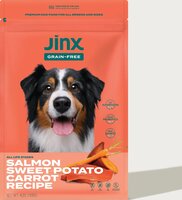
Jinx vs. Solid Gold
In this comparison article for Jinx vs Solid Gold, we'll highlight the key differences between these two pet food brands. To properly compare Jinx and Solid Gold, we'll use up-to-date nutritional and price information.
There are many factors to consider when choosing the best pet food brand for your pet. Factors such as ingredient quality, guaranteed analysis, product safety, brand history, and cost are among the most important factors to consider.
Throughout this Solid Gold vs Jinx comparison, we've utilized average data to make general comparisons. If you'd like to see individual product reviews, visit our Jinx Review Page or Solid Gold Review Page.
Guaranteed Analysis: Solid Gold vs. Jinx
According to AAFCO, all pet food labels must provide a guaranteed analysis of nutrient content. The analysis must provide guaranteed minimum percentages of crude protein and crude fat, and maximum percentages of crude fiber and moisture.
All percentages used in this comparison are averages reported on a dry matter basis.
Jinx Dog Food vs. Solid Gold Dog Food
| Dry Dog Food | Jinx | Solid Gold |
| Crude Protein | 30% | 30.2% |
| Crude Fat | 15.6% | 14.7% |
| Crude Fiber | 5.4% | 5.5% |
Crude Protein Comparison For Dog Food
Dogs require twenty-two amino acids to sustain life. Twelve of these amino acids are synthesized naturally, the remaining ten are consumed. Protein is the nutrient which provides some or all of these ten essential amino acids.
There is a relatively insignificant difference between the crude protein content of the two brands.
Crude Fat Comparison For Dog Food
Fats are an absolutely vital component of a balanced canine diet. Not only do fats provide energy, but they also serve important roles in the normal development and function of your dog's body. For example, fats help dogs produce prostaglandins, which reduce inflammation among many other significant functions.
Both brands provide roughly the same amount of crude fat.
As you can see, Jinx and Solid Gold guarantee a similar amount of crude fiber.
Jinx Pet Food Ingredients vs. Solid Gold Pet Food Ingredients
Jinx and Solid Gold both use the following controversial ingredients in many of their products:
Here are some of the controversial ingredients used only by Solid Gold.
We believe that certain pet food ingredients are linked to adverse health affects; these ingredients are classified as harmful.
Here are some of the harmful ingredients used only by Solid Gold.
Product Safety: Recall History of Jinx & Solid Gold?
According to our records, Jinx has never been recalled.
Solid Gold has been recalled once.
- May 8, 2012: Salmonella
Price Comparison: Which Brand Is More Expensive?
| Dry Dog Food | Jinx | Solid Gold |
| Per Pound | $2.52 | $2.90 |
| Per Calorie | $0.0015 | $0.0018 |
The average cost-per-lb is heavily influenced by the varying amounts of moisture present in each brand's food products (wet vs. dry food, dry vs. freeze-dried food, etc). However, the average cost-per-kcal eliminates the influence of moisture. Therefore, the average cost-per-kcal is the better metric to consider.
If you'd like to calculate the average cost-per-day or cost-pet-year of feeding Jinx or Solid Gold, input your pet's weight into our cost analyzer widget.
Averages price data can identify whether or not there exists a significant price difference between two brands. However, the actual price that you'll pay for Jinx or Solid Gold will depend on your shopping habits.
Pet owners who use our price comparison feature typically save more than 25% off retail prices for Jinx and Solid Gold. In addition, we currently have some great coupons for our readers.
- 20% Off First Auto-Ship @ PetFlow (Use Code PAWDIET20)
- 35% Off First Auto-Ship @ Chewy (No Code Required)
- 15% Off The Entire Site @ OnlyNaturalPet (Use Code AFPAWDIET)
Disclosure: PawDiet has an affiliate relationship with stores featured (or linked-to) in this article. We are compensated for referring customers. Thank you for shopping with our retail partners!
Where To Buy Jinx Pet Foods
You can purchase Jinx pet foods from the following stores:

Where To Buy Solid Gold Pet Foods
You can purchase Solid Gold pet food products from these retailers:



Type Of Pet Foods Available
| Product | Jinx | Solid Gold |
| Dry Dog Food | 4 Recipes | 23 Recipes |
| Wet Dog Food | None | 13 Recipes |
| Dog Treats | 7 Treats | None |
| Dry Cat Food | None | 8 Recipes |
| Wet Cat Food | None | 28 Recipes |
| Cat Treats | None | None |
Top Rated Jinx Recipes
Top Rated Solid Gold Recipes
